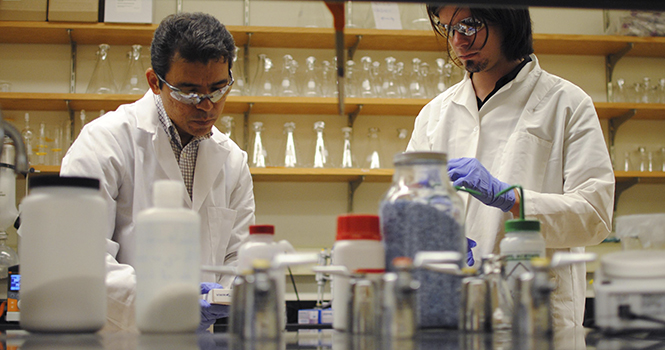Liquid crystal researchers give inside look at labs
A professor guides junior biotechnology major Alek Nielsen as they participate in research in the biomaterials lab in the liquid crystal building on Friday, September 14. The project involves stem cell research and could last for 5-6 years. Photo by Jenna Watson.
November 26, 2012
Although adamant about safety, Alek Nielsen, a Liquid Crystal Institute student researcher, was not intimidated by the boxes with “TOXIC” labels and the skull-and-cross-bones symbols about the lab. He suited up in his white lab coat, snapped on some purple medical gloves and put on orange-reflective eye protection that looked like a hybrid of sunglasses and an astronaut’s visor.
“I’ve always wanted to be a mad scientist,” Nielsen said, “or do Frankenstein stuff that kind of pushes the boundaries of what people would think is possible.”
Nielsen explained in layman’s terms a type of biomedical application that they hope to develop.
“It’s kind of like a pill except we can tell them where to go and what to do much better than just sticking a pill in your stomach,” Nielsen said. “Say someone forgot to take their insulin. The injected pill will time-release the insulin on its own without you having to control it.”
Although Nielsen is not an expert when it comes to liquid crystals, he said it’s easy to pretend that you know what you’re doing when you really have no clue.
“It’s a secret, but I don’t actually know what many of these things mean,” he said. “I just know what I’m supposed to say to make it look like I know.”
Elda Hegmann, a Liquid Crystals Institute assistant professor and Canadian native, was hired at Kent State last October.
“When I came here, I didn’t have a group. It was just myself — no chemicals, no nothing,” Hegmann said.
Most professors at the Liquid Crystals Institute have active research labs.
Funded by university money, Hegmann hired students, bought chemicals and organized her own lab.
“When I’m teaching a class, I go through the material that is specific to that particular class, but sometimes I am able to tell the students what I am doing here,” Hegmann said. “I’m not just a teacher. I’m actually a researcher.”
Once students became interested in what Hegmann was researching, she said it snowballed from there. Students would hear about her research by hearsay or a visit to her website.
“This is how I found [student researchers] Cory, Tory and Alek,” she said.
Nielsen, junior biotechnology major and a new member on Hegmann’s team, found out about her research while working for another lab.
Nielsen plans to stay with Hegmann’s lab until he graduates, but wants to hold off on going to grad school for a couple of years. It is a possibility that he will go do agriculture research work in Africa.
“If this research doesn’t get into a publication, it’s OK because I still get to work in a lab with all the shiny equipment at LCI,” Nielsen said.
Senior biology major Cory Mahnen came to know about Hegmann’s need for researchers by word of mouth. Hegmann hired him after a quick interview earlier this fall.
Mahnen said he has always wanted to be a doctor.
“I’ve always been into science,” Mahnen said. “I pretty much just have a natural curiosity that led me to science.”
Mahnen said he wants to continue with this lab until he graduates and then he wants to come back to work on his Ph.D. while researching pharmaceutical delivery systems.
Junior biology major Tory Stankovich said she became interested in Hegmann’s research because she wanted to try something outside her comfort zone.
“I’m doing it to get experience in research and see if I enjoy it, which I do,” Stankovich said.
She wants to attend Duke Medical School to become a doctor after graduating from Kent State.
Many science majors are required to take an individual investigation for graduation credit, she said.
Nielsen said anybody who wants to work in the lab can be a part of the research team.
“Anybody can do this stuff,” Nielsen said. “You go in there with a very meager amount of experience in whatever field it is and talk to these people and they will probably need somebody to do some grunt work in their lab.”
Contact Brittney Trojanowski at [email protected].












